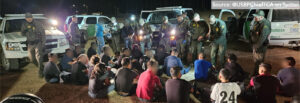Few of the policymakers in Washington who will decide our nation’s next immigration reform have any idea of the human tragedy taking place at the U.S.-Mexico border. I got a glimpse of it last week.
I just completed a trip to the Arizona-Sonora border with colleagues from three Latin American organizations who I have worked with over the years on human rights issues in the Americas.
In Tucson, we talked with immigration lawyers and judges; activists who distribute water in the desert as a humanitarian gesture to keep people from dying; and the Medical Examiner’s Office responsible for identifying the hundreds of dead migrants found in the desert. In Nogales, Mexico, we met with priests and nuns who try to ease the pain of those who have been deported.
We watched an hour-long deportation proceeding against 45 people. The trial we saw was under “Operation Streamline”—the quickest way to get deported. The first time you are caught crossing the border is a misdemeanor; the second is a felony. These were repeat crossers. “Felons?” They had most likely risked five days in the desert more than once. What compels one to consider those risks your best hope for a future?
The offenders entered a modern, grandiose, and somewhat sterile courtroom chained at their hands and feet—40 men, 5 women. They were called up in groups of five. Each stood before a microphone with a lawyer they had just met that morning. They had all signed a plea agreement, waiving their constitutional rights, including any right to appeal. Each pleaded guilty and was sentenced to between 30-180 days. They filed out in groups of five on their way to detention facilities to serve out their time.
One person deviated from the norm, interrupting the flow of Streamline. She was Honduran. When the judge asked if she pleaded guilty or not guilty she said, “Not guilty.” Again he asked, “Guilty or not guilty.” She repeated, “Not guilty.” The judge then asked her to sit back down and talk with her lawyers. When all of the others had been tried he returned to her, “How do you plead, guilty or not guilty.” She hesitated and finally gave the answer she was supposed to, “Guilty.” My mind raced. Did she know what was going on? Did she want to apply for asylum? What was her story? We will never know. This process was not designed for dissent. Not guilty is not an option here.
After the trial, the judge came down to talk with the observers who included a group of students from Georgetown University. He explained that he didn’t like the system either, but it was his job to implement the law. Under the current law, Streamline was the best case scenario. If the accused didn’t plead guilty he or she would ultimately be found guilty and get even longer prison sentences. How can the judges and lawyers blame only the legislators for this injustice? They are a part of this process.
I can’t explain how sad I felt. Is this what we now call due process– mass trials where guilty is the only reasonable response? I looked at those sunburned faces as they walked past me on their way to prison.
My colleagues from Latin America had a different reaction. They were shocked and angry. A colleague from Argentina, who represents many of the victims of murder and disappearance during that country’s dirty war, called it a “simulation of due process.” “Is this the justice system that the United States promotes throughout Latin America?” he fumed.
While visiting a shelter in Nogales, Mexico for women and children who had been deported I heard a story that will haunt me as well. We asked if anyone would be willing to talk with us. One woman was. Her story was complicated. She had lived in Chicago for 20 years, but was undocumented. She has two teenage girls, both U.S. citizens. She had separated from her partner and decided to return to Mexico to care for her elderly parents in her home state of Michoacán. She set up a small business in her town, but soon thereafter thugs connected to organized crime began demanding monthly payments. The amount demanded was too high. She fell behind in her payments. The business failed. The thugs told her that if she didn’t come up with the money that they knew where her children went to school. To make the point, they showed up at the school, asking about her kids. Terrified for their safety she sent her girls, who are U.S. citizens, back to Chicago to live with their father. Now she was trying to reunite with her kids.
She had tried to cross the border 11 times. She had repeatedly attempted the journey across the desert. A horrific journey at best, as it isn’t possible to carry enough water to survive. She has nowhere to go but to be with her children. She can’t go back to Michoacán. The last time she was caught crossing the border she prayed to God to let her die. She planned to attempt another crossing that day. I hope she made it.
The border divides us from them. It also divides us from our own values. In different ways it is a tragedy for us all. As I look back on my notes from the courtroom, I wrote in the margin, “History will not judge us well for this.”
Joy Olson, Executive Director of the Washington Office on Latin America (WOLA), is a leading expert on human rights and U.S. policy toward Latin America. Under her direction, WOLA is pioneering new approaches to human rights advocacy, focusing on the underlying causes of injustice, inequality, and violence.

